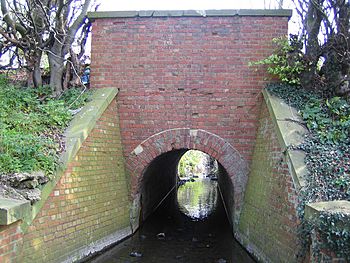The Rye (brook) facts for kids
Quick facts for kids The Rye |
|
|---|---|

The Rye at Gutters Bridge, Leatherhead
|
|
| Country | England |
| Region | South East |
| District | Mole Valley District |
| City | Leatherhead |
| Physical characteristics | |
| Main source | Ashtead Common |
| River mouth | River Mole Leatherhead |
The Rye is a small stream located in Surrey, England. It begins its journey east of Ashtead and flows into the River Mole near Leatherhead.
Contents
The Rye's Journey
The Rye Brook flows west across Ashtead Common. This area is part of the Ashtead Common National Nature Reserve. The City of London Corporation helps manage this special place.
For a long time, the brook followed a very straight path. This straight channel was dug during the Second World War. The goal was to drain the land so farmers could use it to grow food.
Making the River More Natural
In 2005, the City of London Corporation started a project. They wanted to make parts of the Rye Brook more natural. This involved making the river bend and curve again. They also reshaped the riverbed and banks. These changes help create a wetland habitat. This new environment encourages many different kinds of wildlife to live there.
Water Quality of The Rye
The Environment Agency checks the water quality of rivers in England. They give each river an overall "ecological status." This status tells us how healthy the river's ecosystem is. It can be high, good, moderate, poor, or bad.
They look at several things to decide this. One is the "biological status." This checks the types and numbers of living things in the water. These include small creatures like invertebrates, plants like angiosperms, and fish.
Another check is the "chemical status." This looks at different chemicals in the water. They compare the levels of these chemicals to safe amounts. Chemical status is either "good" or "fail."
How Healthy is The Rye?
In 2019, the Rye Brook at Ashtead had a "moderate" ecological status. This means it's not as healthy as it could be. Its chemical status was "fail." This suggests there are too many chemicals in the water. Efforts are ongoing to improve the water quality for the wildlife and environment.
 | Mary Eliza Mahoney |
 | Susie King Taylor |
 | Ida Gray |
 | Eliza Ann Grier |

